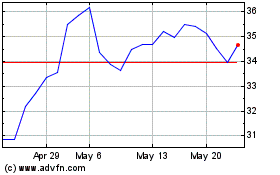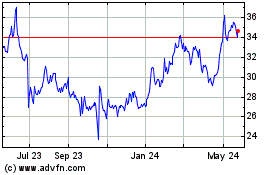3rd UPDATE: Ranbaxy Settles Quality Issues With FDA
December 21 2011 - 6:08AM
Dow Jones News
BANGALORE (Dow Jones)-Ranbaxy Laboratories Ltd. (500359.BY)
Wednesday said it has settled all manufacturing practise issues
with the U.S. health regulator, an agreement which could pave the
way for parent Daiichi Sankyo Co. (4568.TO) to finally benefit from
its pricey Indian acquisition.
Daiichi Sankyo bought a little more than 60% of Ranbaxy for $4.6
billion in 2008, a deal which was seen as expensive but a key step
for the Japanese company's global expansion plans.
However, just three months after the acquisition, the Food and
Drug Administration banned Ranbaxy from exporting more than 30
generic drugs into the U.S. because of alleged manufacturing
violations at its plants at Dewas and Paonta Sahib in north
India.
The FDA also halted reviews of drug applications from Paonta
Sahib in 2009, alleging that Ranbaxy falsified data.
Ever since then, the unit has been a drag on Daiichi Sankyo's
profits, with several issues with the FDA and the U.S. Justice
Department queering the pitch and leaving investors unsure about
exactly how things would pan out.
Even Wednesday, Japan's third-biggest pharmaceuticals company by
market capitalization had to nearly halve its group profit forecast
for the fiscal year through March to Y26 billion from the previous
projection of Y50 billion, and cut pay for its senior executives by
5% to 30%.
This is because of $500 million (Y38 billion) that Ranbaxy said
it will make a provision for to settle any liabilities resulting
from a separate probe by the U.S. Justice Department into whether
the Indian company manufactured substandard generic drugs.
On the bright side, the resolution of the two issues "will allow
Daiichi Sankyo to expand worldwide sales of its new drugs using the
Ranbaxy network," said Satoru Takaoki, a pharmaceutical analyst at
Tokyo-based SMBC Friend Research Center.
It wasn't immediately clear by when Ranbaxy will be allowed to
restart selling drugs manufactured at the two plants, but the FDA
settlement and the $500 million provision "bring greater
predictability to Ranbaxy's U.S. operations," said Arun Sawhney,
Ranbaxy chief executive and managing director.
In a step supporting this view, the Indian generic drug maker
said soon after the settlement announcement that it will start
marketing some of the products originally discovered by Daiichi in
Malaysia.
Ranbaxy said it will start marketing Cravit--a drug used for
treating bacterial infections--in Malaysia from Jan. 1. The product
is currently marketed by First Pharmaceutical Sdn Bhd in the
country.
In November, Ranbaxy launched the generic version of Lipitor,
the cholesterol-lowering drug from Pfizer Inc. Ranbaxy was awarded
sales exclusivity under U.S. federal law as it was the first
successful generic challenger to Lipitor.
Also Wednesday, a local media report said that Ranbaxy has
received approval from the FDA for one of its facilities in
northern India's Mohali area, from where the company will start
supplying drugs to the U.S. next year.
Sounding a word of caution, Bino Pathiparampil, vice president
at brokerage IIFL Capital, said that, although there is a consent
decree now, "it is going to take at least more than a year [it
takes time for the company to implement the corrective measures]
before we can see some product approvals."
The approvals may come only in small batches and may not be for
the entire facility, he added.
The FDA settlement, which came with a "consent decree," could
lead to the FDA reopening reviews of applications for exports to
the U.S. of drugs manufactured at Paonta Sahib.
A consent decree is a settlement of a lawsuit or criminal case
in which a person or company agrees to take specific actions
without admitting fault or guilt for the situation that led to the
lawsuit.
--By Dhanya Ann Thoppil, Dow Jones Newswires; +91-9886929464; dhanya.thoppil@dowjones.com
Daiichi Sankyo (PK) (USOTC:DSNKY)
Historical Stock Chart
From Dec 2024 to Jan 2025

Daiichi Sankyo (PK) (USOTC:DSNKY)
Historical Stock Chart
From Jan 2024 to Jan 2025
